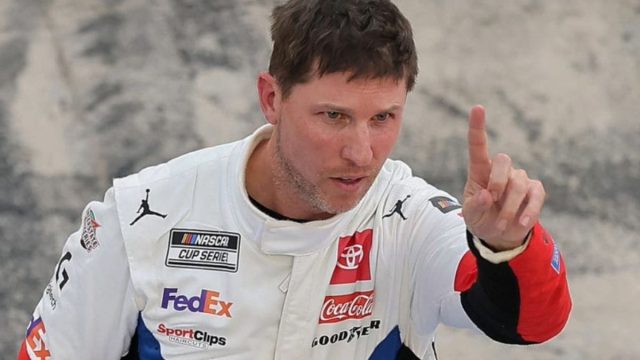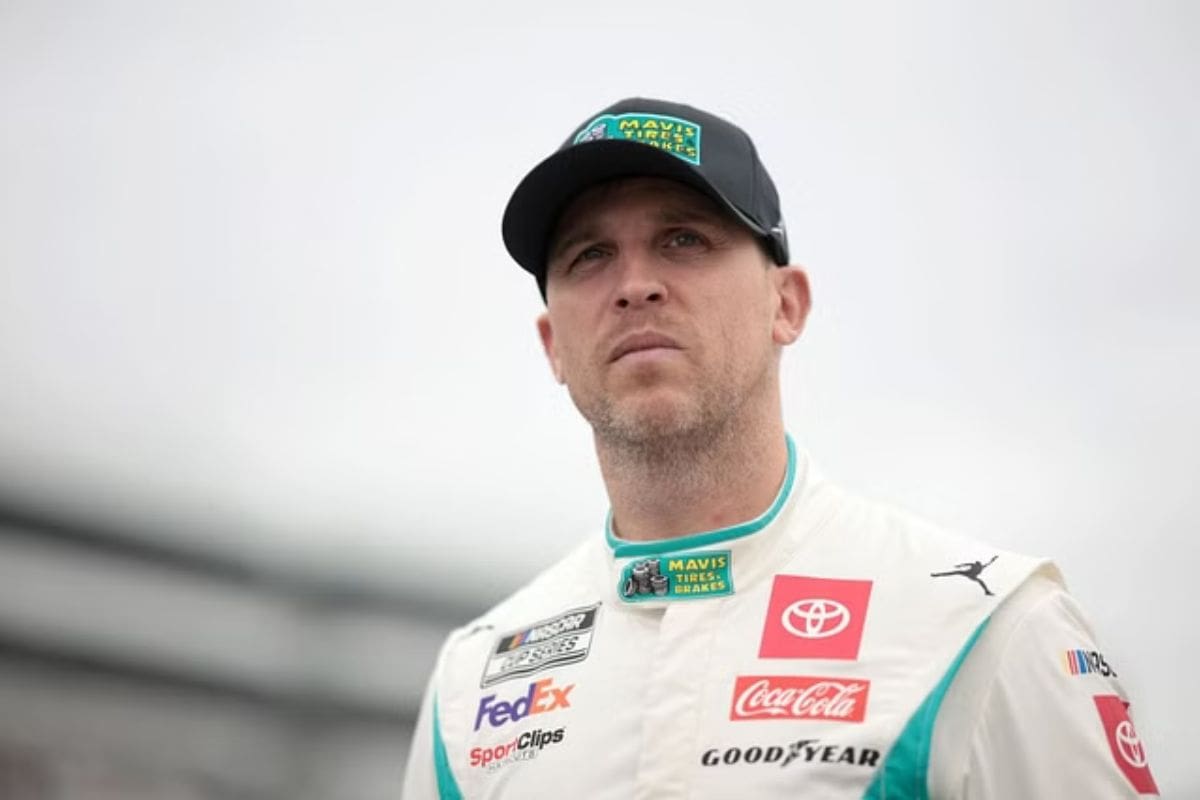Denny Hamlin Alleges NASCAR Biased Towards Kyle Larson: Denny Hamlin‘s recent allegations of NASCAR bias toward Kyle Larson, particularly in the wake of Ryan Blaney’s protests after the Brickyard 400, raise noteworthy questions about the integrity of officiating in the sport. Hamlin’s critique not only highlights the emotional strain on drivers but also emphasizes a perceived inconsistency in decision-making that could favor certain competitors. This situation prompts a broader examination of NASCAR’s regulatory framework and accountability measures. As tensions mount, the implications for driver relationships and the future of the sport become increasingly complex, inviting further exploration into the underlying dynamics at play.
Key Highlights
- Denny Hamlin expressed concerns about perceived bias in NASCAR officiating, particularly favoring Kyle Larson during critical race moments.
- Ryan Blaney’s protests stem from frustrations over controversial late-race decisions and Larson’s tactics in the Brickyard 400.
- Hamlin highlighted the emotional toll on drivers, emphasizing the need for fairness and consistency in NASCAR’s officiating.
- Previous controversies, like the Toyota Owners 400 restart, illustrate ongoing issues with NASCAR’s enforcement of rules and perceived favoritism.
Ryan Blaney on NASCAR’s Officiating Standards
The Brickyard 400 at Indianapolis Motor Speedway unfolded as a dramatic spectacle, marked by controversial calls and an intense debate between Ryan Blaney and Kyle Larson that reignited conversations about NASCAR’s officiating standards. The race, a hallmark event on the NASCAR calendar, featured a result of tactical driving and missteps that ultimately defined its outcome. Blaney, assured a coveted victory, found himself ruined by Larson’s controversial late-race strategy. This incident not only cost Blaney the win but also sparked a broader debate regarding the integrity of the officiating process.
Critics have pointed to the Next Gen car’s performance issues and the unpredictable dynamics of the 2.5-mile oval as contributing factors to the race’s heightened tensions. However, it was the perceived favoritism in NASCAR’s late-race decisions that truly ignited outrage among fans and competitors. Blaney’s frustration was noticeable, as he articulated concerns over the consistency and transparency of race officiating, showing a growing sentiment that the rules might be bending to favor certain drivers.
As the dust settled, NASCAR executives moved to clarify the controversial calls, yet their explanations did little to soothe Blaney’s grievances. The aftermath of the Brickyard 400 serves as a reminder of the balance between competitive spirit and regulatory fairness within the sport. With voices like Denny Hamlin supporting Blaney’s stance, the consequences of this race will likely echo through the remainder of the season, shaping discussions around accountability in NASCAR.
Hamlin’s Perspective on NASCAR’s Officiating
Denny Hamlin’s insights into the recent officiating controversies reveal a deep concern for fairness within NASCAR, highlighting the emotional and competitive turmoil faced by drivers like Ryan Blaney.
Hamlin’s remarks show the dynamics of racing, particularly in intense environments like the Indianapolis Motor Speedway. Blaney’s frustration stems not only from the perceived favoritism shown towards Kyle Larson but also from the inherent unpredictability that can dictate the outcomes of races.
The complexities of race strategy and officiating are further complicated by the variations of track positions during critical moments. Hamlin’s analysis points to the notable disadvantage Blaney faced when Larson, utilizing a tactical advantage, executed a restart that many viewed as controversial. This scenario represents the balance between skill and luck, where split-second decisions can lead to profound implications for championship standings.
“Some of the calls I thought were just super questionable when it comes to whether they did the caution in the end or not.” – (hamlin)
Moreover, Hamlin’s empathy for Blaney highlights the psychological burden drivers carry, going through not just their competitors but also the regulatory frameworks that govern their sport. By questioning the legitimacy of NASCAR’s decisions, Hamlin invites a broader dialogue about accountability and consistency in officiating—a fundamental pillar for maintaining the integrity of competitive racing.
“I think probably Blaney was just in a tough spot. The outside lane just does not work. It didn’t matter if he just cleared them by all but two inches. The bottom was gonna be so significant and faster. The 12 was done when the 5 slid it up there.” – (hamlin)
Hamlin Analyzes Larson’s Strategy at Indianapolis
Analyzing Kyle Larson’s tactical driving during the Brickyard 400 reveals a calculated approach that capitalized on the unfolding dynamics of the race, showing the critical balance between strategy and officiating in intense situations. Larson’s team, led by crew chief Cliff Daniels, exhibited foresight regarding the fuel situation of competitor Brad Keselowski, which positioned them advantageously as the race neared its finale.
“The most likely scenario is that the 6 if he didn’t run out, he was gonna run out at the track, bottom at the 5 up, and cause a huge crash. The 5 was likely gonna be in it…I think they asked. That was a very heads-up position for Cliff Daniels as he asked the officials that, hey, FYI, if they do run out, we can’t pull out before the start/finish line, right? So they were on it right from the get-go ’cause they knew that the 6 was in dire straits.” – (hamlin)
Denny Hamlin pointed out that the Hendrick Motorsports team was astutely aware of the risks posed by Keselowski’s low fuel levels. This awareness allowed them to devise effectively, preparing for potential caution scenarios that might arise from a fuel miscalculation. Hamlin indicated that the decision-making process by Larson’s crew was not only proactive but also indicative of their understanding of race dynamics, as they sought clarification from officials regarding race protocol in the event of a caution.
However, Hamlin’s critique extended beyond planning; he suggested that NASCAR’s officiating seemed to favor Larson, raising questions about the fairness of the race’s outcome. He proposed that perhaps a clearer ruling could be made for situations like that of the final laps, where a singular leader could be insulated from the typical on-track chaos.
“I don’t know. It might be a situation where NASCAR’s happy with how this whole thing played out.” – (hamlin)
“I think in that situation…maybe we just let the leader, let the lone car on the front row stay there – no sliding up. Maybe that’s more fair, right? That seems like a more reasonable thing, ’cause it definitely changed the outcome of this race.” – (hamlin)

Denny Hamlin’s Past Controversy with NASCAR
Controversies surrounding officiating decisions in NASCAR often create a complex narrative, particularly when examining Denny Hamlin’s recent experiences during pivotal races like the Toyota Owners 400. This incident not only emphasized Hamlin’s competitive edge but also highlighted the examination he faces regarding NASCAR’s enforcement of rules and perceived bias.
The Toyota Owners 400 was set to be Martin Truex Jr.’s victorious race as he dominated for most of the laps. However, Hamlin dashed his hopes at the end. He capitalized on an early restart and went on to clinch the victory. The governing body justified its decision with a vague rationale, emphasizing the live nature of the sport, which further complicated perceptions of fairness among fans and competitors.
“We’re a live sporting event. We don’t have the luxury of a timeout, and go to the sidelines, and review it, and make that call.” – (nascar officials)
The backlash against Hamlin following the Richmond race earlier this year shows a pattern where he becomes a focal point for criticism, often attributed to the inconsistent officiating surrounding his performances.
NASCAR’s Restart Rules and Driver Frustrations
The ongoing discourse surrounding officiating decisions in NASCAR finds further complexity in the recent remarks from Michael McDowell and Ryan Blaney, who both highlighted the longstanding frustrations with restart rules and their implications for competitive fairness. McDowell’s assertion that the leader should inherently possess an advantage during restarts resonates with a growing sentiment among drivers.
“If you’re the leader, you should have the advantage under every circumstance. There should never be a situation where the leader doesn’t have the advantage on a restart…You watch Formula One, they restart where they want to. Watch IndyCar, they restart where they want to. The leader (has) earned the right to control the race. In our situation, it’s not. It’s entertainment that we’ve got to be two- and three-wide and put on a show at the end of it. Because of that, not the best car wins.” – (McDowell)
This sentiment aligns with Blaney’s candid admission following a recent race, acknowledging the ambiguity in the NASCAR rulebook regarding restarts. The implications of these discussions extend beyond individual races, calling into question the integrity of the competition itself.
News in Brief: Denny Hamlin Alleges NASCAR Biased Towards Kyle Larson
The ongoing discourse surrounding perceived favoritism in NASCAR highlights important concerns regarding the integrity of the sport. Denny Hamlin’s criticisms, particularly regarding Kyle Larson and the aftermath of the Brickyard 400, show the necessity for consistent officiating and equitable treatment of drivers.
As emotions run high and frustrations mount, the call for accountability and clearer regulations becomes increasingly essential to restoring trust among competitors and fans. The future of NASCAR may depend on addressing these critical issues.
Also Read: Denny Hamlin Exposes Fuel Mileage Crisis in NASCAR



Solve the problem. Go back to the real NASCAR and RACE to the yellow flag. The only true way to win. Now you can win a 500 mile race by racing 497 miles.
As everything it’s about money. Chevy has the biggest presence and NASCAR intends to keep it that way.
What we have now used to be called theI IROC SERIES WHICH FAILED MISERABLY.
$$$$$$$$$$$$$$$$$$$&&